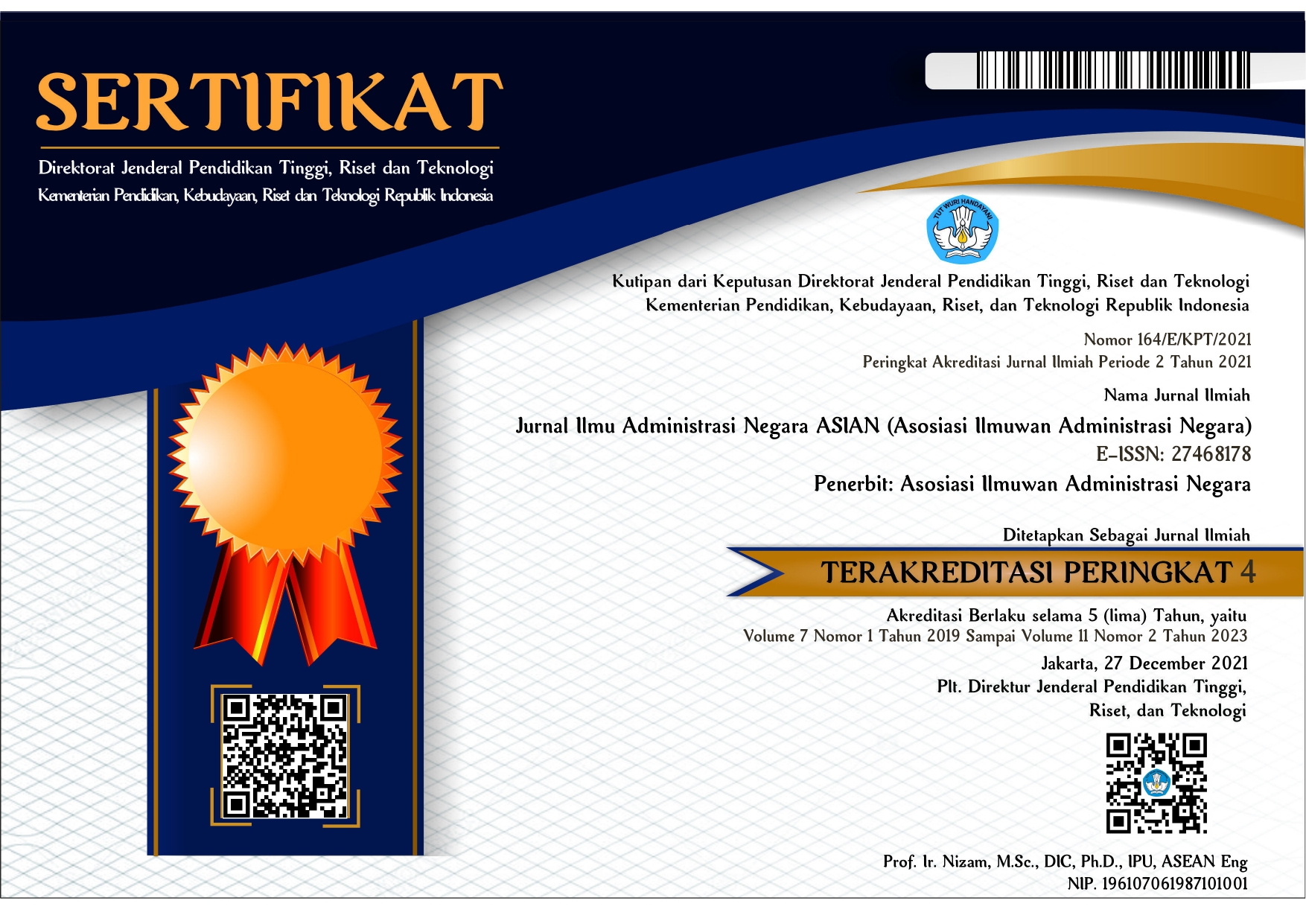Analisis Kualitas Pengelolaan Bus Tayo Dalam Mewujudkan Kota Tangerang Sebagai Smart City
 Abstract views: 1104
,
Abstract views: 1104
,
 PDF downloads: 1373
PDF downloads: 1373
Abstract
Tangerang City Government has implemented a smart city policy, with public transportation via Bus Tayo being one of its programs. The difficulties encountered in managing Bus Tayo include a lack of integration with other modes of transportation, a lack of reliability of facilities on board, inaccurate schedules, and inflexible payment systems. This study aims to analyze the community satisfaction index towards Bus Tayo services and the quality of bus management by the operator. This study employs a mixed method (quantitative and qualitative). The quantitative data came from passenger perception surveys, and the qualitative data came from interviews, observations, and document studies, with key informants being PT. Tangerang Nusantara Global officials. Result show that the community satisfaction index on Bus Tayo services is 68.55 with a good predictor. All performance targets, namely environmental sustainability, safety, physical and social accessibility, reliability and consistency, integration of micromobility, and integration of information and communication technology, have not been met in terms of Bus Tayo management quality. As a result, increasing the number of human resources, improving the service culture, improving the quality of bus infrastructure and facilities, and implementing a flexible multi-payment system are all necessary.
Downloads
References
Jurnal:
Ali, I. I., Akmal, M. I., Alfisyahrin, A. L., Indrawan, N. F., & Tikson, S. D. S. (2018). MAKASSAR SMART TRANSPORTATION: Penerapan Mamminasata Apps dan Mamminasata Card guna optimalisasi Bus Rapid Transit (BRT) Kota Makassar. JBMI (Jurnal Bisnis, Manajemen, Dan Informatika), 14(1). https://doi.org/10.26487/jbmi.v14i1.2069
ANWAR, S. (2020). ANALISIS BUKTI EMPIRIS TENTANG DAMPAK EKUITAS SOSIAL EKONOMI OPERASIONAL BUS RAPID TRANSIT (BRT) DI NEGARA BERKEMBANG. Eduka : Jurnal Pendidikan, Hukum, Dan Bisnis, 4(2). https://doi.org/10.32493/eduka.v4i2.3851
Arliliwati, Rusli, Z., & Yuliani, F. (2018). Evaluasi Manajemen Pelayanan Publik. JIANA (Jurnal Ilmu Administrasi Negara), 15(3).
Ayudia, S., Nadeak, B., & Suyaman, D. J. (2021). Evaluasi Mutu Pelayanan Puskesmas Terakreditasi Berdasarkan Indeks Kepuasan Masyarakat Di Kabupaten Karawang. Syntax Literate ; Jurnal Ilmiah Indonesia, 6(6). https://doi.org/10.36418/syntax-literate.v6i6.2340
Caragliu, A., del Bo, C., & Nijkamp, P. (2011). Smart cities in Europe. Journal of Urban Technology, 18(2). https://doi.org/10.1080/10630732.2011.601117
Creswell, J. W., Fetters, M. D., & Ivankova, N. V. (2004). Designing a mixed methods study in primary care. Annals of Family Medicine, 2(1). https://doi.org/10.1370/afm.104
Damayanti, L. D., Suwena, K. R., & Haris, I. A. (2019). ANALISIS KEPUASAN MASYARAKAT TERHADAP PELAYANAN PUBLIK BERDASARKAN INDEKS KEPUASAN MASYARAKAT (IKM) KANTOR KECAMATAN SAWAN KABUPATEN BULELENG. Jurnal Pendidikan Ekonomi Undiksha, 11(1). https://doi.org/10.23887/jjpe.v11i1.20048
Fetters, M. D., Curry, L. A., & Creswell, J. W. (2013). Achieving integration in mixed methods designs - Principles and practices. Health Services Research, 48(6 PART2). https://doi.org/10.1111/1475-6773.12117
Giffinger, R. (2007). Smart cities Ranking of European medium-sized cities. In Research Institute for Housing, Urban and Mobility Services (Vol. 16, Issue October).
Hariani, M. L., Santoso, I., & Wibowo, S. S. (2020). Analisis Kebijakan Struktur Tarif dan Pengaruhnya terhadap Besaran Subsidi (Studi Kasus : TransJakarta). Jurnal Manajemen Aset Infrastruktur & Fasilitas, 4(3). https://doi.org/10.12962/j26151847.v4i3.7102
Ivankova, N. V., Creswell, J. W., & Stick, S. L. (2006). Using Mixed-Methods Sequential Explanatory Design: From Theory to Practice. Field Methods, 18(1). https://doi.org/10.1177/1525822X05282260
Karlina, O. (2021). Analisis Dan Perancangan Sistem Informasi Rute Dan Halte Bus Rapid Transit Kota Bandar Lampung Berbasis Android. Jurnal Informatika Dan Rekayasa Perangkat Lunak (JATIKA), 2(2).
Kurniawan, I. A. (2019). IMPLEMENTASI KEBIJAKAN TRANSPORTASI PUBLIK BUS TRANSJAKARTA (BUSWAY) DALAM RANGKA MENGURANGI KEMACETAN. JURNAL ILMIAH ILMU ADMINISTRASI, 9(1). https://doi.org/10.33592/jiia.v9i2.258
Lebiedzik, M. (2020). Application of the global concept of “smart city” at the local level of the karvina district. Sustainability (Switzerland), 12(17). https://doi.org/10.3390/su12177186
Mayasari, A. (2020). Analisis Pengaruh Kualitas Pelayanan Terhadap Kepuasan Masyarakat Di Desa Paulan, Colomadu, Karanganyar. Jesya (Jurnal Ekonomi & Ekonomi Syariah), 3(2). https://doi.org/10.36778/jesya.v3i2.181
Nagy, S., & Csiszár, C. (2020). The quality of smart mobility: A systematic review. In Scientific Journal of Silesian University of Technology. Series Transport (Vol. 109). https://doi.org/10.20858/sjsutst.2020.109.11
Pena, M. M., da Silva, E. M. S., Tronchin, D. M. R., & Melleiro, M. M. (2013). The use of the quality model of parasuraman, zeithaml and berry in health services. Revista Da Escola de Enfermagem, 47(5). https://doi.org/10.1590/S0080-623420130000500030
Prakasa, B., & Subardono, A. (2017). Implementasi Big Data Pada Data Transaksi Tiket Elektronik Bus Rapid Transit ( BRT ). Citee 2017, September.
Ristiani, I. Y. (2020). Manajemen Pelayanan Publik Pada Mall Pelayanan Publik di Kabupaten Sumedang Provinsi Jawa Barat. Coopetition: Jurnal Ilmiah Manajemn, 11(2).
Rohmah, U. (2020). Pelaksanaan Citizen Charter Sebagai Inovas dalam Manajemen Pelayanan Publik di Kota Yogyakarta. Transformative.Ub.Ac.Id, 1(2), 161–175. https://transformative.ub.ac.id/index.php/jtr/article/view/118
Buku:
Lemeshow, S., Homer Jr, D. W., Klar, J., & Lwanga, S. K. (1997). Besar Sampel dalam Penelitian Kesehatan. Diterjemahkan oleh Dibyo Pramono. Gadjah Mada University Press, Yogyakarta. Hal, 50–52.
Taufiqurokhman, & Satispi, E. (2018). Teori dan perkembangan manajemen pelayanan publik. Umj Press 2018.
Copyright (c) 2023 Jurnal Ilmu Administrasi Negara ASIAN (Asosiasi Ilmuwan Administrasi Negara)

This work is licensed under a Creative Commons Attribution-ShareAlike 4.0 International License.
Authors who publish with this journal agree to the following terms:
1. Copyright on any article is retained by the author(s).
2. The author grants the journal, right of first publication with the work simultaneously licensed under a Creative Commons Attribution License that allows others to share the work with an acknowledgment of the work’s authorship and initial publication in this journal.
3. Authors are able to enter into separate, additional contractual arrangements for the non-exclusive distribution of the journal’s published version of the work (e.g., post it to an institutional repository or publish it in a book), with an acknowledgment of its initial publication in this journal.
4. Authors are permitted and encouraged to post their work online (e.g., in institutional repositories or on their website) prior to and during the submission process, as it can lead to productive exchanges, as well as earlier and greater citation of published work.
5. The article and any associated published material is distributed under the Creative Commons Attribution-ShareAlike 4.0 International License








